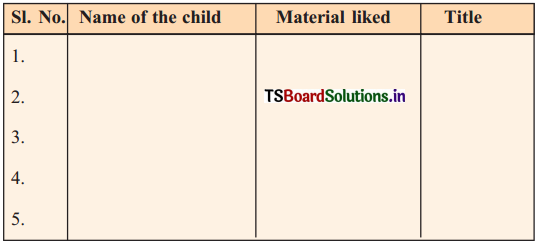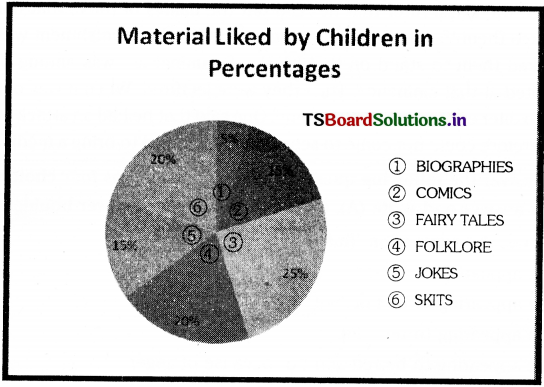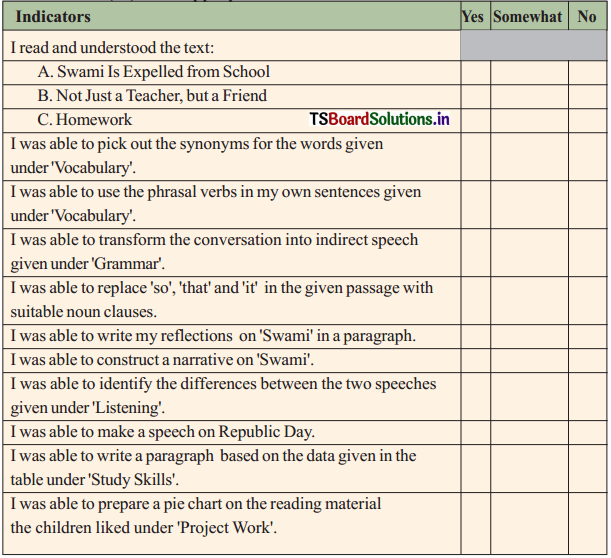Telangana SCERT 9th Class English Guide Pdf Telangana Unit 3C Homework (Poem) Textbook Questions and Answers.
TS 9th Class English Guide Unit 3C Homework
Questions and Answers:
Answer the following questions.
Question 1.
What is the main purpose of giving homework to children?
Answer:
The main purpose of giving homework to children is to reinforce what they leam at school, and ultimately to help them learn the material better.
Question 2.
How can excessive homework decrease students’ interest in studies?
Answer:
When excessive homework is given to students, they should be away from all other recreational activities. They become sleepless. They should not share their feelings with their family. All these things decrease the interest of students in studies and subjects.
![]()
Question 3.
Why do many teachers defend large amounts of homework?
Answer:
Many teachers defend large amounts of homework. They say that it helps to prepare students for world that is becoming increasingly competitive.
Question 4.
How does homework take time away from important elements of daily life?
Answer:
Bonding and building strong family relationships with their families is an important element of the daily life of the students. Their bonding becomes strong by spending a lot of time with . their parents. But due to heavy homework students are not able to spend sufficient time with their parents. They are not able to take a break from their homework schedule. Parents also ask their children to complete the homework first and their talk is next. In families where both the parents are employees, the condition is very serious. In such families children have no bonding with their parents.
Question 5.
Is the writer in favour of or against homework? Justify your reasons.
Answer:
The write is in favour of homework but he opposes giving the excessive amounts of homework. He believes that a reasonable amount of homework will help children to enhance their learning. He does not ask to abolish the system of homework. He asks to continue the system in creative and interesting ways so that the child enjoys it.
![]()
Project Work:
Conduct a survey to find out the kind of reading material the children like to be included in the textbook which makes them more interesting.
Ask them which of the following they enjoy most and complete the table:
| comics | poems |
| biographies | fairy tales |
| playlets | stories |
| skits | jokes |
| scientific essays | news reports |
| folklore | diaries |
| songs | magazines |
| essays | speeches |
![]()
Work in groups and consolidate the data you have collected.
Collect the data in the given format.

Prepare a pie chart with the collected data. Analyse the pie chart and name the materials they enjoyed reading.
Answer:
Step – 1 (Collection of Data)
Group – 1
| Name of the Child | Material liked | Title |
| 1. K. SINDHU | COMICS | Amar Chitra Kathalu |
| 2. K. GANESH | FOLKLORE | Panchatantra Stories |
| 3. K. PUJITHA | FAIRY TALES | Grandma Stories |
| 4. V. MADHU | FAIRY TALES | Grandma Stories |
| 5. GH. MADHURI | FOLKLORE | Panchatantra stories |
Group – 2
| Name of the Child | Material liked | Title |
| 1. M. MADHAVI | FAIRY TALES | Grandma Stories |
| 2. V. VASAVI | FAIRY TALES | Grandma Stories |
| 3. V. BHANU PRAKASH | FOLKLORE | Panchatantra Stories |
| 4. A. SULOCHANA | FAIRY TALES | Grandma Stories |
| 5. M. DHANALAKSHMI | FOLKLORE | Panchatantra Stories |
![]()
Group – 3
| Name of the Child | Material liked | Title |
| 1. G. VYSHANANI | SKITS | Bala Ramayanam |
| 2. R VASANTHA | JOKES | Panchatantra Stories |
| 3. R HARIKRISHNA | COMICS | Amar Chitra Kathalu |
| 4. M. SOUMYA | SKITS | Lava-Kusa |
| 5. A. MANEESHA | JOKES | Panchatantra Stories |
Group -4
| Name of the Child | Materiel liked |
Title |
| 1. G. VYSHANAVI | SKITS | Chota Bheem |
| 2. P. VASANTHA | JOKES | Kunwar Singh Jokes |
| 3. P HARIKRISHNA | COMICS | Stephen Leacock |
| 4. M. SOUMYA | SKITS | Pasalapudi Kathalu |
| 5. A. MANEESHA | BIOGRAPHIES | Swami Vivekananda |
![]()
Step – 2 (Consolidation of Data):
| Name of the Child | Material liked | Title |
| 1. A. MANEESHA | BIOGRAPHIES | Swami Vivekananda |
| 2. K. SINDHU | COMICS | Amar Chitra Kathalu |
| 3. P HARIKRISHNA | COMICS | Amar Chitra Kathalu |
| 4. P HAREKRISHNA | COMICS | Stephen Leacock |
| 5. K. PUJITHA | FAIRY TALES | Grandma Stories |
| 6. V. MADFIU | FAIRY TALES | Grandma Stories |
| 7. M. MADHAVI | FAIRY TALES | Grandma Stories |
| 8. V. VASAVI | FAIRY TALES | Grandma Stories |
| 9. A. SULOCHANA | FAIRY TALES | Grandma Stories |
| 10. K. GANESH | FOLKLORE | Panchatantra Stories |
| 11. CH. MADHURI | FOLKLORE | Panchatantra Stories |
| 12. V. BHANLJ PRAKASH | FOLKLORE | Panchatantra Stories |
| 13. M. DHANALAKSHMI | FOLKLORE | Panchatantra Stories |
| 14. P VASANTA | JOKES | Panchatantra Stories |
| 15. A. MANEESHA | JOKES | Panchatantra Stories |
| 16. P VASANTHA | JOKES | Kunwar Singh Jokes |
| 17. G. WSHANANI | SKITS | Bala Ramayanam |
| 18. M. SOUMYA | SKITS | Lava Kusa |
| 19. G. VYSHANAVI | SKITS | Chota Bheem |
| 20. M. SOUMYA | SKITS | Pasalapudi Kathalu |
Step – 3 (Extraction of Percentages)
| Material liked | No. out of 20 | Percentage (%) Extracted |
| 1. BIOGRAPHIES | 1 | 5 |
| 2. COMICS | 3 | 15 |
| 3. FAIRY TALES | 5 | 25 |
| 4. FOLKLORE | 4 | 20 |
| 5. JOKES | 3 | 15 |
| 6. SKITS | 4 | 20 |
Step – 4 (Preparation of a Pie chart)

![]()
Self Assessment:
How well have I understood this unit?
Read and tick (✓) in the appropriate box.

![]()
Homework Summary in English
Homework is usually given to students to reinforce the things they learn at school. It usually helps the students learn the material better. But too much homework is not useful. It has some negative effects on students. This essay stresses the importance of limiting the amount of homework . to be given to children. On the other hand it discusses the adverse affects of excessive homework.
The amount of homework given to children has been increased in repent times. The present day competition also encourages school to try to increase the volume of the curriculum. Some teachers say that large amounts’of homework prepares students for the competitive world. The amount of homework given to students is higher in colleges than that of schools. A lot of homework usually means a lot of books.
Carrying large amounts of weight daily at a young age can do a lot of damage and it leads to chronic shoulder, neck and back pain. Excessive amount of homework makes some students sleepless. Some parents and teachers argue that it limits students after school activities. Children spending their whole time in doing homework become overweight and they fall to obesity.
Homework takes away the time of children spending with their families. It is worse in families where both the parents are employees. Excessive homework and assignments cause students lose their interest in subjects. In such times they try to copy and cheat. Those bad habits will haunt the kids throughout their life. They like to take easy ways.
The use of homework is effective when it is given in the limited and reasonable amounts. Homework should not be abolished but it should be limited. It should be creative and interesting so that the stude/its enjoy it.
![]()
Glossary:
historically (adv) : relating to past
reinforce (v) : make a feeling or an idea stronger
ultimately (adv) : in the end/finally
counter-productive (adj) : having the opposite effect to the intended
excessive (ad)) : greater than what seems reasonable
restrict (v) : limit the size, amount or range of something
acclaimed (v) : approved/praised/welcomed
claim (v) : say something is true
dates (v) : exists
emerged (v) : started to exist/started to be known
Incentive (n) : something that encourages you to do something
curriculum (n) : the subjects that are included in a course of study
defend (v) : say something in support of something that has been criticized
increasingly (adv) : more and more all the time
harmful (adj) : causing damage to health and environment
backpack (n) : a large bag carried on the back of people
chronic (adj) : difficult to cure
insufficient (adj) : not enough
beneficial (adj) : useful
academics (n) : teachers/researchers
obesity (n) : the state of being very fat
overweight (adj) : too heavy and fat
self-esteem (n) : a feeling of being happy with your own character and abilities
depression (n) : a condition in which a person feels very sad and anxious
bonding (n) : the process of forming relationship with a group of people
precious (adj) : valuable or important
haunt (u) : disturb
adverse (ad)) : negative and unpleasant
overwhelming (adj) : very great
siblings (n) : brothers or sisters
toil (n) : hard unpleasant work
hinder (v) : to make it difficult for somebody
abolish (v) : to do something end a system